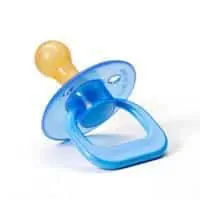It’s often the maternity ward staff that fosters one of the hardest baby behavioral issues to kick: pacifier use. A plastic substitute for the breast, a binky leaves most babies content as can be. In fact, when dipped in sugar pacifiers have even been shown to reduce pain in infants during shots, medical procedures, or blood draws. It’s that pacifying quality for which they gained their name that leads many parents to keep up the habit the hospital started, but are binkies good for baby?
Pros for pacifier use in infants:
-Binky use while sleeping may prevent SIDS in the first year of life. In 2005 the AAP began recommending pacifier use during sleep for infants under the age of 1 after a study found they may reduce the risk of SIDS.
-Pacifiers do usually distract and pacify. While some babies are just not binky babies and have no interest in this non-food producing nipple, most are calmed and distracted. Pacifiers can make car rides, doctor visits, and other times when nursing or bottle feeding is impractical fuss-free.
-Binkies help some babies sleep longer and fall asleep faster. The suckling action often makes infants sleep and helps others stay asleep. Many parents swear by a binky at bedtime for this reason.
-Pacifiers may prevent comfort feeding. Some infants eat when upset just to acquire that sucking comfort. A binky allows sucking without feeding and so can prevent over-eating and weight issues.
Cons for binky use in babies:
-Binkies may increase your child’s risk of ear infection. A study done in 2008 found a small increase in middle ear infections in infants that used pacifiers regularly.
-Pacifier use may negatively affect breastfeeding. While studies conflict on the subject, most experts feel that binky use causes babies to breast feed for a shorter length of time, weaning early. Some mothers also report pacifiers cause latch issues while breast feeding.
-Binkies can become habit forming. Much like thumb sucking, pacifier use can become habitual and hard to wean when your child is older.
-Excessive and prolonged pacifier use may lead to dental problems. Numerous studies have shown pacifier use and thumb sucking to cause changes to the dental arch resulting in over, under, or cross bites. In one study, children who continued sucking habits past the age of 2 had a 7.2% higher chance of bite alignment problems. Children who continued past the age of 3 had a nearly 15% higher occurrence of dental arch changes.
When should my baby stop using a pacifier if I do decide to allow it?
Just as a note, any and all pacifier use is recommended to be occasional and not used to replace human contact soothing when possible. You may also want to wait to regularly allow binkies until after breast milk and feeding is well established if you plan to breastfeed. Most dentists at least recommend ditching the binky around age 2 at the latest. Conveniently, many children naturally stop wanting a pacifier in this time frame. Other experts feel babies should not use binkies past the 1-year mark. Still others feel 3 to 4 at the latest. In the end, when to stop using a binky is up to you as a parent if your child doesn’t make the choice on their own before that point.
How can I wean my child from the binky when I’m ready?
There’s really not much to pacifier weaning — you just take it away and brave the storm. You can do so all at once, cold turkey, or slowly over time restricting use little by little. (Example: You can use your binky at bedtime only.)
A few tips that may help include:
-Once you take the pacifiers away, replace them. On that fateful day you get rid of the last binky, give your child a gift to replace them such as a new toy. Some parents like to couple this gift with “the binky fairy,” much like the tooth fairy, who would at night take all the pacifiers and replace them with a treat.
-Once binkies are banished don’t cave. Even one relapse will give your child faith that a world-ending fit may bring it back again. Never cave no matter the inconvenience.
-Avoid lies about what happened to the pacifiers. While a fairy tale like the binky fairy took them may help, lies such as “all the binkies are broken” or “I threw them all away” won’t help. You’re then not teaching your child pacifiers are no longer OK, but that there simply are none. This is bound to back-fire.
-Connect losing this comfort method with growing up. Toddlers just love to feel grown up; explaining to your child why you’re taking away the binky can go a long way. It’s not just an evil new rule mom or dad is enforcing, it’s a rite of passage from baby to big kid.

